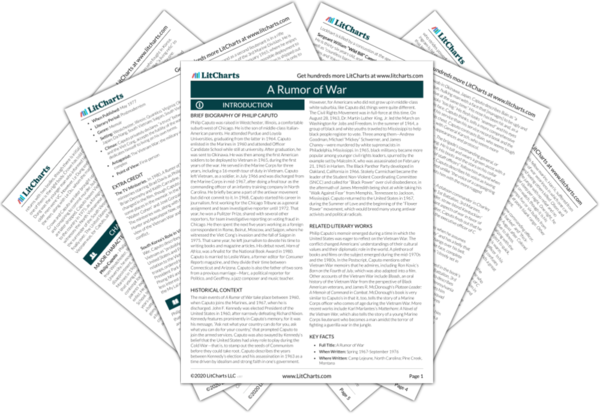Le Dung Quotes in A Rumor of War
I wondered why the investigating officer had not submitted any explanatory or extenuating circumstances. Later, after I had time to think things over, I drew my own conclusion: the explanatory or extenuating circumstance was the war. The killings had occurred in war. They had occurred, moreover, in a war whose sole aim was to kill Viet Cong […] The deaths of Le Dung and Le Du could not be divorced from the nature and conduct of the war. As I had come to see it, America could not intervene in a people’s war without killing some of the people. But to raise those points in explanation or extenuation would be to raise a host of ambiguous moral questions. It could even raise the question of the morality of American intervention in Vietnam […] If we were found guilty, the Marine Corps’ institutional conscience would be clear.
There was murder in my heart and, in some way, through tone of voice, a gesture, or a stress on kill rather than capture, I had transmitted my inner violence to the men. They saw in my overly aggressive manner a sanction to vent their own brutal impulses. I lay there remembering the euphoria we had felt afterward, the way we had laughed, and then the sudden awakening to guilt. And yet, I could not conceive of the fact as one of premeditated murder. It had not been committed in a vacuum. It was a direct result of the war. The thing we had done was a result of what the war had done to us.

Le Dung Quotes in A Rumor of War
I wondered why the investigating officer had not submitted any explanatory or extenuating circumstances. Later, after I had time to think things over, I drew my own conclusion: the explanatory or extenuating circumstance was the war. The killings had occurred in war. They had occurred, moreover, in a war whose sole aim was to kill Viet Cong […] The deaths of Le Dung and Le Du could not be divorced from the nature and conduct of the war. As I had come to see it, America could not intervene in a people’s war without killing some of the people. But to raise those points in explanation or extenuation would be to raise a host of ambiguous moral questions. It could even raise the question of the morality of American intervention in Vietnam […] If we were found guilty, the Marine Corps’ institutional conscience would be clear.
There was murder in my heart and, in some way, through tone of voice, a gesture, or a stress on kill rather than capture, I had transmitted my inner violence to the men. They saw in my overly aggressive manner a sanction to vent their own brutal impulses. I lay there remembering the euphoria we had felt afterward, the way we had laughed, and then the sudden awakening to guilt. And yet, I could not conceive of the fact as one of premeditated murder. It had not been committed in a vacuum. It was a direct result of the war. The thing we had done was a result of what the war had done to us.











